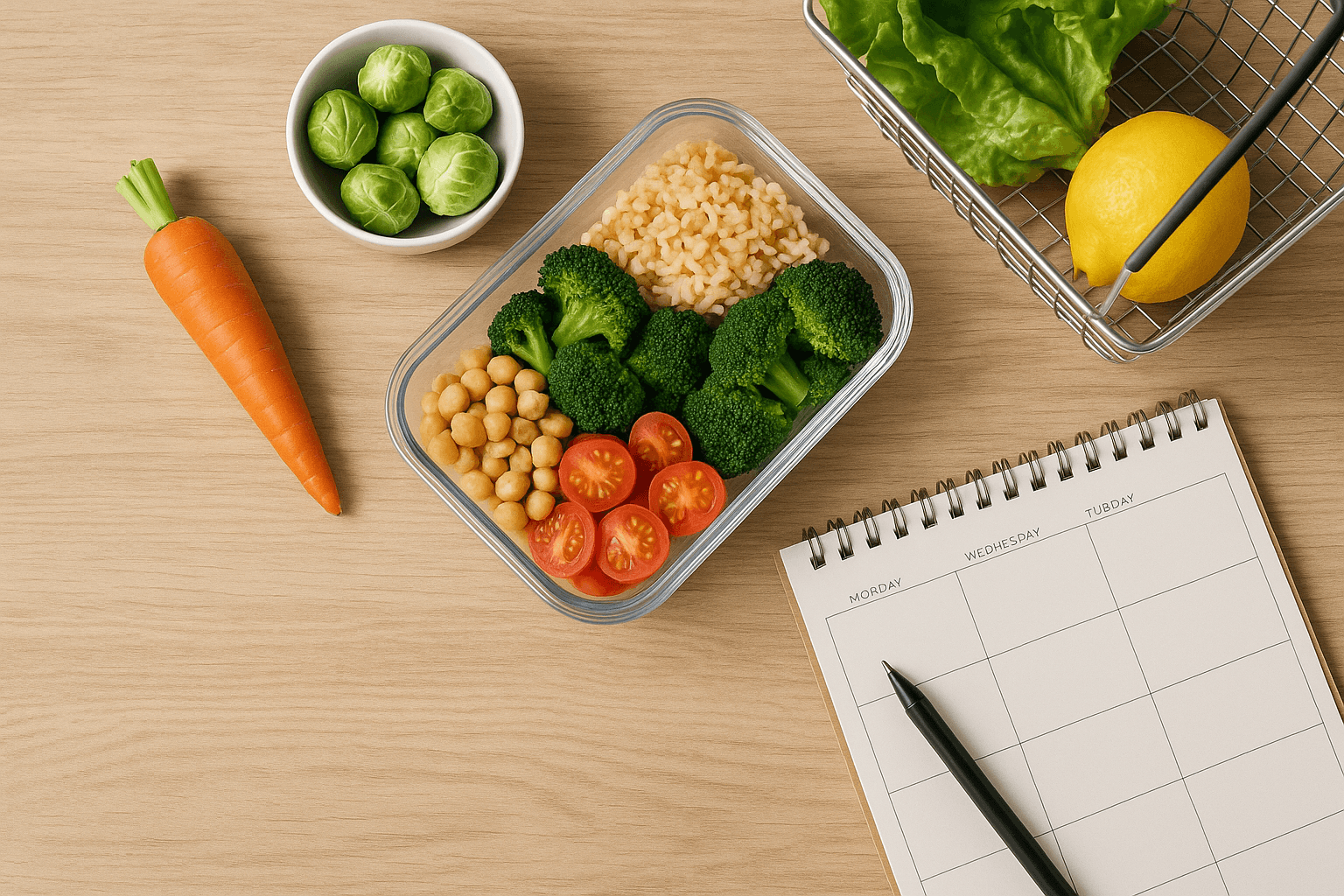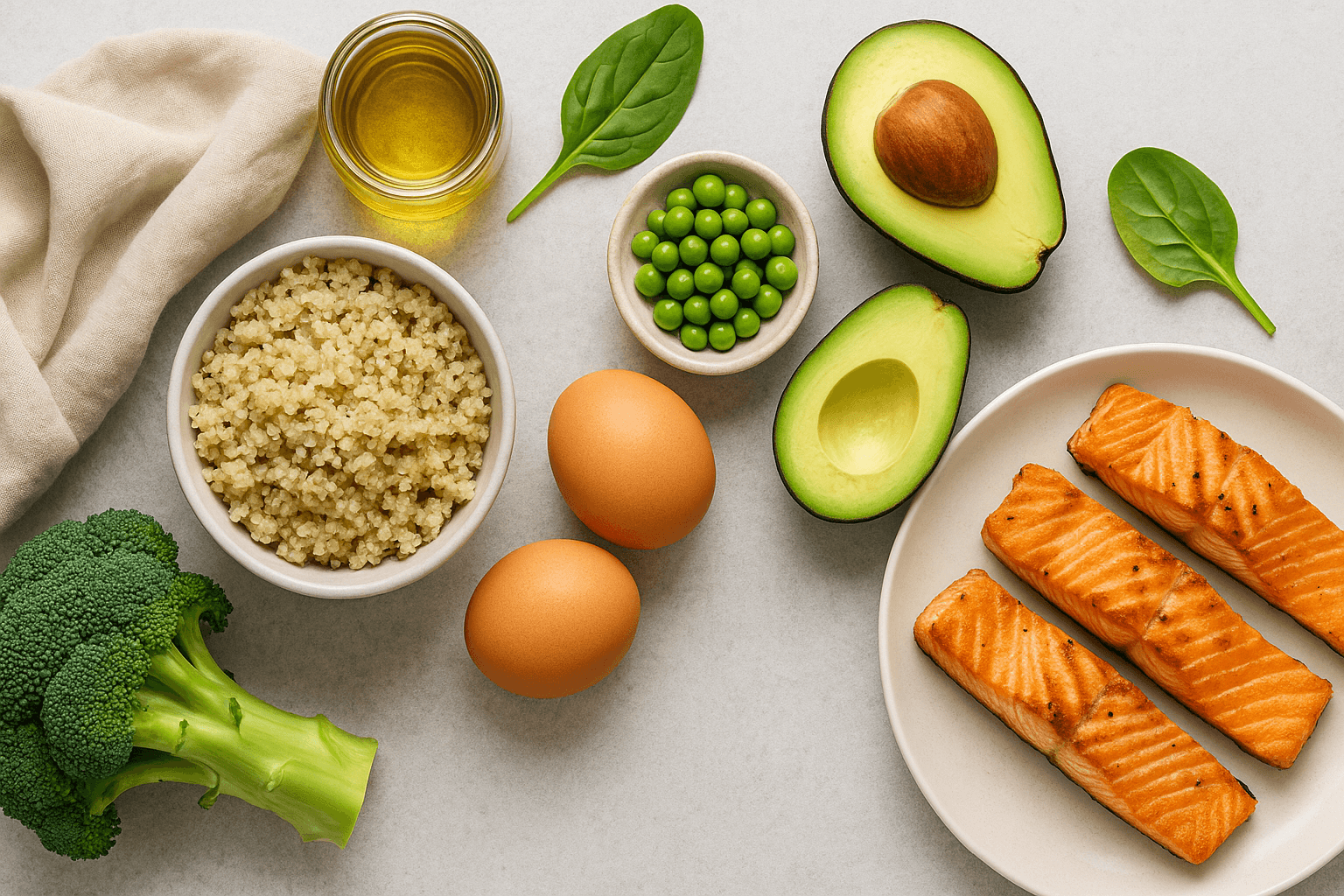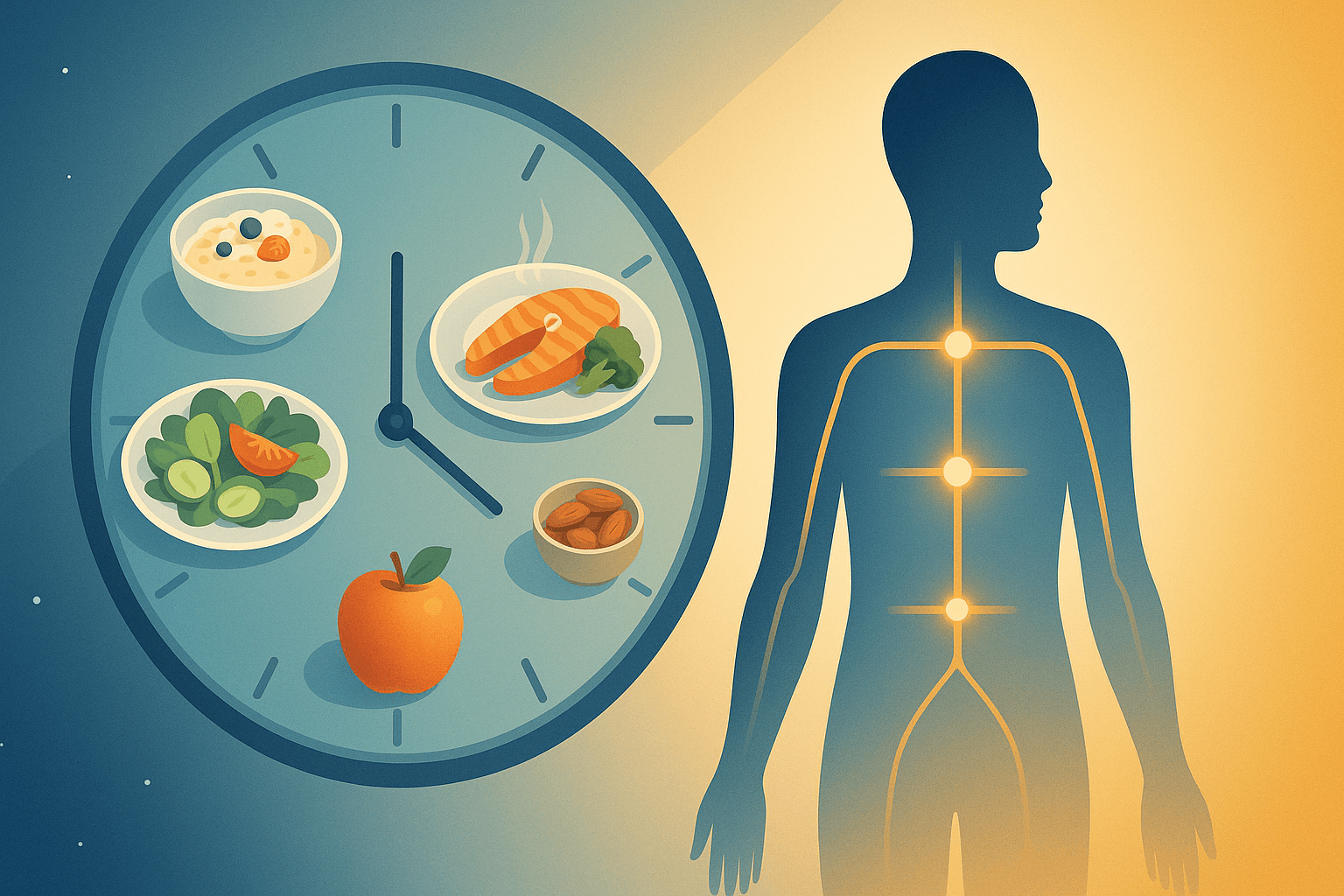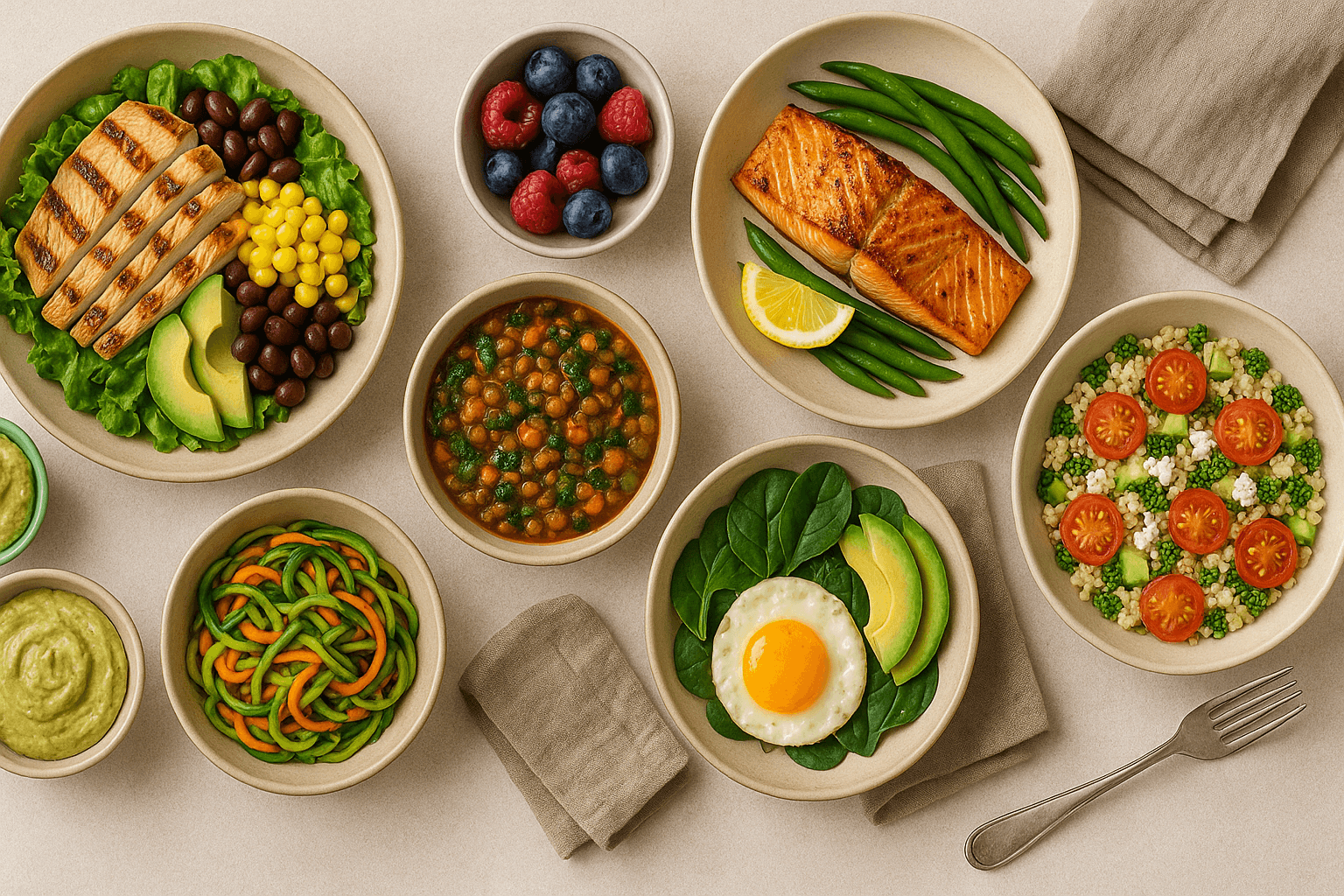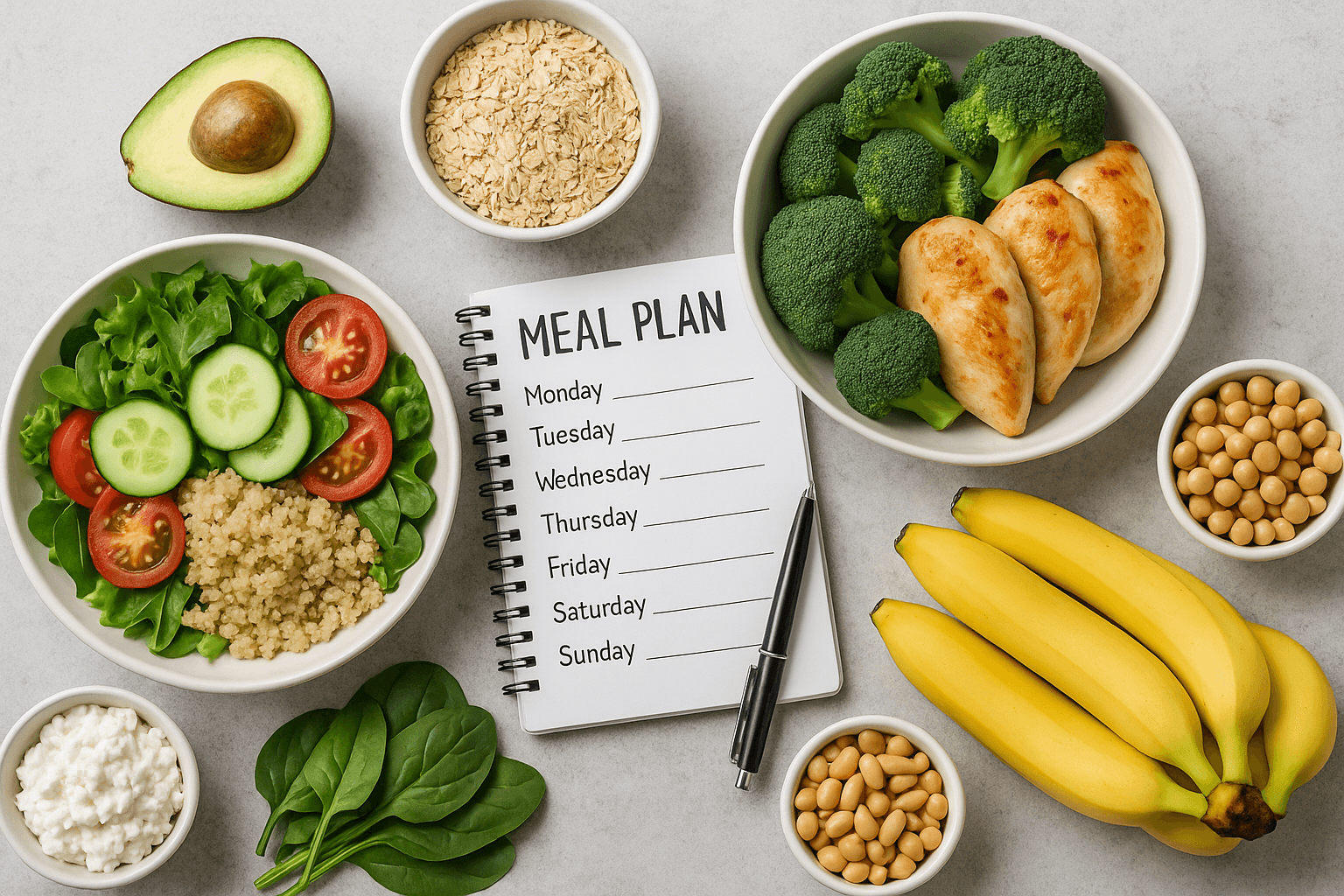MEAL PLANNING FOR MENTAL WELLNESS: HOW FOOD CHOICES AND STRUCTURE SUPPORT YOUR BRAIN, MOOD, AND RESILIENCE
Published on July 29, 2025

When people hear the term “meal planning,” they tend to think about planning a week of meals ahead of time, saving money, getting the calories into counts, and so on. For others, it’s a weight-loss tool or a strategy for eating more home-cooked meals. But there’s another side of meal planning that is the unsung: the way that it can change your mental health. What, when and how you eat affects more than your body, as nutrition science now clearly demonstrates: It can help manage stress, lift your mood, sharpen your focus and strengthen your emotional resilience. If low motivation, shopworn temper, anxiety, or the feeling that something is “off” has ever been any struggle for you, you need to start thinking about meal planning in terms of mental wellness, not just food.
How about if, instead of feeling anxious and overwhelmed the minute Monday rolls around, you turn up to the onset of the workweek with a sense of quiet confidence that every meal you eat will be a small act of self-care. When you stock yourself with meals and snacks that fuel your mind and body, you replace chaos with structure and guesswork with intention. Thoughtful meal planning is not about striving for perfection — it’s about making space for good energy, joy and calm, no matter what life has on the agenda.
How Food and Mood Are Deeply Connected
Your brain is a nutritional juggernaut, consuming roughly 20% of your daily energy even though it accounts for just a small fraction of your total body weight. It’s the only organ in the body that never takes a nap — that is, it never stops working. Every synaptic connection, every thought, every feeling relies on a steady supply of nutrients — amino acids, healthy fats, vitamins, minerals, antioxidants. Low levels of any of these building blocks can rapidly result in mood swings, difficulty concentrating, irritability, fatigue or heightened anxiety.
Emotional highs and lows are frequently the result of blood sugar surges. Skipping meals, too much sugar, leaning on junk food — and the energy and mood rollercoaster could leave you feeling frustrated rather than renewed. There are particularly large associations between nutrient shortfalls and a higher risk of depression and anxiety, especially for nutrients such as B vitamins, vitamin D, magnesium, zinc, iron and omega-3 fats. But the flip side is potent, too: a well-planned, balanced and colorful meal pattern can help control your emotions, whoosh away your anxiety, and sense of control, no matter what the day throws your way.
The Pillars of Meal Planning for Good Mental Health
Balanced Macronutrients:
When planning each meal, aim to combine complex carbohydrates, healthy fats and protein. This cocktail powers your brain, stabilizes blood sugar levels, and serves as the basis for important neurotransmitters like serotonin (the “feel good” chemical) and dopamine (the “motivation and focus” chemical). Whole grains, including beans, sweet potatoes, lean meats, fish, nuts, seeds and avocado, come to mind.
Colorful Variety:
The more colors you incorporate onto your plate, the greater access you’ll have to a whole sweep of antioxidants, phytochemicals and minerals. Each color has its own special set of benefits — greens (for magnesium and folate), oranges and reds (for carotenoids, vitamin C), blues and purples (for polyphenols and brain protection). Strive to “eat the rainbow” daily for the most mood support.
Omega-3 Power:
Omega-3s are an essential component of brain cell membranes and are important for inflammation control. Studies find that people who eat more omega-3s (main sources include fatty fish, and walnuts, flax, chia and hemp seeds) have lower rates of depression and better focus. Attempt to work these brain-boosters into your routine a couple of times a week.
Fermented and Fiber-Rich Foods:
Your gut and your brain communicate ceaselessly through the “gut-brain axis.” Fiber-rich foods, such as legumes, whole grains, fruits and vegetables, also refuel your microbiome, which in turn produces compounds that affect mood and stress. And fermented foods — yogurt, kefir, kimchi, sauerkraut and miso — provide a dose of living probiotics that can help soothe inflammation and promote a happy gut and mind.
Consistent Timing and Routine:
Eating regularly also keeps the blood sugar steady and lowers anxiety levels. And predictability in eating is particularly grounding during busy or anxious periods, and it reduces the “decision load” of minor (but necessary) choices, leaving more mental real estate for the choices that really matter.
Realistic Meal Planning Tips for Mental Health
Plan Ahead, Not Perfect:
You don’t need an Instagram-worthy spreadsheet or every meal plotted. Just a loose plan — a few decent healthy recipes, a shopping list and some staples in the fridge and the pantry — and what might have been a stressful meal can feel completely relaxed. Grains, roasted veggies, proteins, healthy snacks — critical meal components are easier to piece together if they’re prepped ahead of time.
Batch Cook Mood-Boosting Meals:
You can make a big pot of soup, chili, curry or a grain bowl densely packed with more vegetables, legumes and whole grains than grains, and portion it across several days. Freezing the extras ensures you will have a healthy option available even when energy and motivation are in short supply.
Keep Healthy Snacks Visible:
Make the right thing easy. Your fridge is also a great place to store fresh fruit and pre-cut veggies, hummus cups, yogurt, or nuts at eye level. That way, when hunger or stress hits, you have satiating, nourishing snacks at the ready.
Incorporate Comfort Foods—The Healthy Way:
Food is emotional. Rather than depriving yourself, learn to start playing favorites with more nourishing options—like whole grain pasta tossed with extra veggies, baked sweet potato fries, or pizza piled high with colorful toppings.
Prep for Your Schedule:
If mornings are generally rushed, make overnight oats or yogurt parfaits and assemble breakfast burritos you can throw in the freezer all in advance. It’s also important to pack lunches that are well balanced for workdays and plan dinners that are easy to prepare, flavorful, and easy to digest. Tailor your plan to fit your actual life, not someone else’s dream world.
Meal Plan for Mind and Mood: A Sample Day
Breakfast:
Scrambled eggs with spinach and cherry tomatoes, and whole grain toast. Toss in a small bowl of blueberries for an antioxidant punch.
Snack:
Chia seeds mixed into Greek yogurt, honey, and a handful of walnuts. It adds protein, good fats, fiber and a little bit of sweetness for stable energy.
Lunch:
Lentil and vegetable soup with lots of carrots, kale, sweet potato and herbs, plus a nice green salad (arugula, a few pumpkin seeds, vinaigrette) and a piece of dark chocolate for dessert (a serotonin boost).
Snack:
Red bell pepper and carrot sticks with hummus: This snack is high in fiber, vitamin C and plant protein to help keep you full and satisfied.
Dinner:
Baked salmon (or marinated firm tofu), roasted sweet potatoes, steamed broccoli and a sprinkle of sesame seeds. Salmon and tofu are high in omega-3s and protein for a calm, focused evening.
Evening (optional):
A warm cup of chamomile tea with a banana, high in magnesium, which helps relaxation and sleep.
Conscious Meal Prep for Your Brain
Check In With Yourself:
Take a few minutes of your planning time each week to check in with yourself and your feelings and needs. Are you bored, anxious or in need of comfort? Use those insights to help you make meal choices. Ensure you plan for meals to not just be healthy but for you to actually be satisfied, or better yet, nurtured.
Allow for Flexibility:
Life happens. When you skip a meal, order in, or alter plans, allow that to happen. The trick is getting back to favorable habits, not having everything be “perfect” adherence.
Involve Others:
Ask a family member or friend over to cook or prep with you. Socializing in the kitchen is stress relief that makes you happier and adds purpose to planning your meal.
Tiny Habits, Big Results
Hydrate:
Even mild dehydration can put you in a lousy mood and make concentration more difficult. Maintain water (and herbal tea, or a carafe of infused water) and sip throughout the day.
Eat Mindfully:
Pause before eating to be aware of your food — its colors, what it smells and feels like. Steady eating connects you to flavors, hunger and fullness, that you’re missing when you pound your food in a hurry.
Prioritize Sleep:
Simple regularity of your meals can promote better sleep by signaling your body when it’s time to start winding down in the evening. Opt for a light, easy-to-digest dinner and stay away from caffeine in the late afternoon or evening.
Science: Eating for a Happier Mind
Researchers now know that diets rich in colorful fruits and vegetables, nuts, whole grains and omega-3 fatty acids are associated with better mental health and a lower risk of depression and anxiety. Fermented foods and fiber-heavy meals feed the gut microbiome, which then aids in producing neurotransmitters and balancing inflammation, helping to promote mental wellbeing from the inside out. All the while, diets laden with processed foods, sugar and unhealthy fats are associated with more mood swings, mental fatigue and other mental health struggles.
More Than Food: The Ritual and Routine of Mental Feeding
It’s not enough to stock your fridge. It’s a ritual — a predictable routine that grounds your week, provides small points of predictability, and prompts you to take care of yourself. Lighting a candle at dinner, clearing the table, playing calming music or even taking a moment to breathe before eating can change a rush meal into a restorative pause. These rituals can ground you, reduce stress and make even the busiest of days feel more under control.
Meal planning is like future self-care, too. When you meal prep, you send your future self a message: “I am worth being taken care of, even when it’s tough.” In time, these little acts of trust and faithfulness accrue and cultivate trustworthiness and confidence in your capacity to survive life’s tempests.
Wrap-Up: Creating a Brain-Healthy, Soul-Feeding Meal Plan
Your meal plan is so much more than a weight-management tool or just a time saver — it’s the blueprint for your life force, your emotional stability, and your happiness. By deliberately selecting foods and practices that nourish your mind, you give yourself the ability to face the world with greater calm, clarity, and resilience. Every meal is an opportunity to make an investment in yourself — and I don’t just mean physically, but mentally and emotionally, too.
So as you plan for the next week, treat meal planning for what it is: a nourishing act of self-love. Let everything you do to make nourishing food be something that leads to your happiest and healthiest self: every grain bowl, every colorful salad, every soothing soup or homemade snack. You’re not simply feeding your body; you’re nourishing your spirit, one delicious meal at a time.



